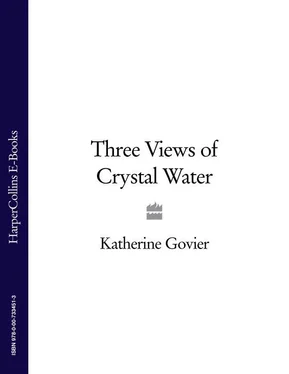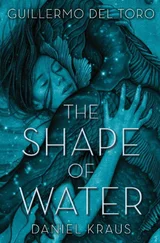It’s really as much of a crowbar as a knife, this tool that centuries of diving has developed. It fits into the cracks between the rocks and, because it has a bend in it, even slides under the edge of the rough shell. I slice sideways with as much strength as I can muster, although I have no earth to brace myself. It cuts the muscle that holds this shellfish to the rock.
This is the trick. I place my free hand on the knife. Kicking with my feet I slash, hard. This is my special cut. Guide with the right, power with the left, I repeat to myself. The abalone detaches. Holding it in my left hand I replace the tegane behind my belt with my right. Then I kick again, trying to plant my feet on sand. But a surge of motion, like a sleeper’s unconscious roll, takes me sideways and I lose my grip on the shell.
My lungs warn me; there’s not much time left. The surge relents and I tumble back to where I started, and in the little release of pressure that comes from the water’s movement, I get my feet down and both hands in the crevice. The abalone comes away, leaving a small storm of protest on the sand floor. Creatures hiding in its lee roll away and the sand itself flies up in protest.
Cradling the razor-edged shell against my chest, I try not to cut myself. I tug on the rope which disappears above me into the column of blue. I feel like a monk at the base of a bell tower, pulling with all his might to make the bells swing. But their clappers are stopped.
I wait for the return tug from above. I hang on to my rope and my shell and try to rise. I cannot see him there in the little leaf-shaped boat shadow that floats over my head, but I hope the boatman is pulling hand over hand, as fast as he can, so that the rope comes in and falls at his feet in expert circles. I can see, shooting up from the clouded depths, my friends rising too, like slim angels called to heaven.
1
Mei
Attacking from in front
So this is how it began.
Vera, bereaved, a slip of a girl, stood in a slanting rainfall on the quay. The year was 1934 and she was thirteen. It was a romantic moment in what she hoped would be a romantic life. This little girl, who was me, but has now become, with the perspective of twenty-five years, a stranger called Vera, was waiting for her grandfather. She had loved him for her whole life, a love renewed on his infrequent stops from the sea to dry land, and now she would be his. He was an elusive man, James Lowinger, the pearl merchant, a wild, imposing man whose portrait, a painting of a white-whiskered Poseidon braced against the mast in a tearing wind, dominated the parlour Vera shared with her mother, Belle. But he was coming home.
The Empress of Japan slid into its berth, high-bowed and with attendant pomp. With a great rumble and sigh the engines stopped, and the porters began to run up the long ramps pulling their wheeled carts. The passengers leaning over the rails waved to loved ones below and then began to walk unsteadily down the hypotenuse to terra firma.
No waves for Vera.
On she stood in the cold, under her umbrella. She looked and looked, clutching her skirt with her free hand, waiting for the White-Moustached God to make his appearance. At length he did so at the top of the ramp. There he was, just like his portrait, ruddy and bewhiskered. He waved. She looked over her shoulder. To whom was he waving? She looked back. He was waving to her. She was amazed he recognised her. Then he turned his head to speak to the tiny person who stood beside him.
A woman. In a kimono.
Vera was not entirely surprised. Her mother had made reference to James Lowinger’s travelling companions, biting her lip. Her grandfather and the small Japanese woman came down the hypotenuse. Vera didn’t give him a chance to speak first. She stepped forward.
‘Grandfather,’ she said.
‘It is really you, my dear?’
‘Yes it is. It’s Vera.’
He appeared astonished, and delighted. ‘Vera. My darling.’ He opened his arms.
‘Grandfather,’ she said warningly, ‘I have to tell you.’
He opened his arms more widely.
He wasn’t listening. She had to stop him. ‘Grandfather, Mother died.’
He started, but did not lose his composure. The wind-roughened cheeks twitched; neck sinews stood out over his starched collar; hands clutched, probably involuntarily, at his trouser legs in a gesture eerily like her own; the ruddy colour drained from his face.
‘She did what?’ He said this in a thin voice of incredulity.
Vera could see that he wasn’t comprehending. He had trouble with the verb, the ‘action word’, they called it at school. It was throwing him off.
‘She died. She’s dead,’ Vera amended.
The hand went to pull his moustache. ‘I see,’ he said.
He saw, but what did he see? Did he see Vera, child of his child, bereft and soaked to the skin and all but transparent with grief?
Or did he visualise, in that instant when he knew she was gone, his beloved daughter Belle? Did Belle’s shortened life from the moment of her birth inscribe itself in his mind? How he held her in his arms, in Yokohama, when his wife handed the baby over without a word? How he tried, but not hard enough, to keep her with him in Japan? Did he think of the first time he lost the girl to his wife? Or the second to marriage? Or the third to Vancouver, Canada, a beautiful city with a view to the Orient?
Or did his mind trip, as his foot tripped – over the grief struck grandchild, and his dead daughter – and stumble on the wife who’d given them to him? Did he think of Sophia, whom he had replaced with this young, Japanese woman?
Vera did not know. James Lowinger recovered his balance and put his foot down on dry land.
He was not at ease there. His life was water. One bit of land or another was much the same; it was not-sea. The news had caught him at the moment of landing, of crossing over from water to earth. All of his life, crossings had marked him – going from island to boat, from boat to mainland. Ramps and bridges were the same. He tripped, he lost his footing. All went into flux, his language, his understanding, his memory.
The Japanese woman caught his arm.
He turned to her. She stood there not getting a word of it. He was unsteady; her arm was holding him up. He hardly knew this little girl, though he recognised her, could not miss her, with that white hair. She was strangely personable, for a child, and too much like his wife for comfort.
‘This is my granddaughter, Vera,’ he said. ‘Vera,’ he said, ‘this is Miss Tanaka. Keiko.’
Miss Tanaka, Keiko, was younger than Belle. Younger than Belle had been, rather, because now it is clear that Belle was never to grow old. Vera was as much a surprise to Keiko as Keiko was to Vera. A surprise and yet not a surprise: James Lowinger was a man who had secrets. He gave nothing away, until he had to. The day before, carelessly, as land came into view, he had told her: ‘Oh Keiko, by the way. A long time ago I was married in Yokohama. My wife was English. She left me and took our child to England. Belle married a bounder; he’s left her I imagine. She has a child, my granddaughter. I wired them, that we were coming.’
But he hadn’t wired we . Only I .
As her grandfather and Keiko stepped off the gangplank, Vera was conscious of herself as a girl needing to be rescued. She had been brave for long enough. She hoped to let down for a bit. When their feet touched terra firma and she had delivered her news she offered up both arms in her grandfather’s general direction, for an embrace. She made the same undiscriminating gesture to the unknown Japanese woman. Then, turning toward home, she worked her hand into her grandfather’s, the one that was not carrying the valise, and allowed a few tears to fall.
Читать дальше



![Roger Zelazny - 24 Views of Mt. Fuji, by Hokusai [Illustrated]](/books/290246/roger-zelazny-24-views-of-mt-fuji-by-hokusai-il-thumb.webp)







